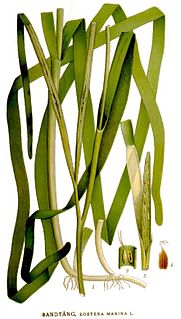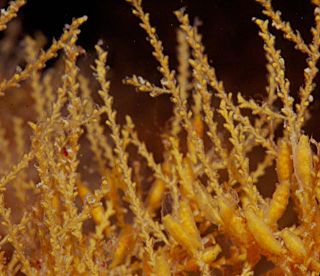
Zosteraceae is a family of marine perennial flowering plants found in temperate and subtropical coastal waters, with the highest diversity located around Korea and Japan. Most seagrasses complete their entire life cycle under water, having filamentous pollen especially adapted to dispersion in an aquatic environment and ribbon-like leaves that lack stomata. Seagrasses are herbaceous and have prominent creeping rhizomes. A distinctive characteristic of the family is the presence of characteristic retinacules, which are present in all species except members of Zostera subgenus Zostera.

Petter Adolf Karsten was a Finnish mycologist, the foremost expert on the fungi of Finland in his day, and known in consequence as the "father of Finnish mycology".
Charles Baron Clarke was a British botanist. He was born at Andover, the eldest son of Turner Poulter Clarke. He was educated at King's College School, London, and at Trinity and Queens' Colleges, Cambridge. He began the study of law at Lincoln's Inn in 1856 and was called to the bar in 1860. He lectured in mathematics at Presidency College, Calcutta, from 1857 to 1865. Clarke was Inspector of Schools in Eastern Bengal and later of India, and superintendent of the Calcutta Botanical Garden from 1869 to 1871. He retired from the Indian Civil Service in 1887. He was president of the Linnean Society from 1894 to 1896, and was elected a fellow of the Royal Society in 1882. He worked at Royal Botanic Gardens Kew until his death in 1906.

Bornetella is a genus of green algae in the family Dasycladaceae.
Duboscquella is a genus of dinoflagellates.

Jania is a genus of red seaweeds with hard, calcareous, branching skeletons in the family Corallinaceae. Members of the genus are found in sheltered reef habitats, often in crevices or other shaded areas.

Eudendrium is a large genus of hydroids (Hydrozoa), one of two in the family Eudendriidae. These animals are marine cnidarias in the family Eudendriidae.

Sertulariidae is a family of hydrozoans.

Thuiaria is a genus of hydroids in the family Sertulariidae.

Sertularella is a genus of hydroids in the family Sertulariidae.

Halopterididae is a family of hydrozoans.

Plumulariidae is a family of hydrozoans.

Plumularia is a genus of hydrozoans in the family Plumulariidae.

Aglaophenia is a genus of hydrozoans in the family Aglaopheniidae.

Macrorhynchia is a genus of hydroids in the family Aglaopheniidae.
Buckollia is a genus of plants in the Apocynaceae, first described in 1994. It is native to eastern Africa.

Sertularia is a genus of hydroids in the family Sertulariidae.
Battersia is a genus of algae belonging to the family Sphacelariaceae.

Zygophylax is a genus of cnidarians belonging to the family Zygophylacidae.













